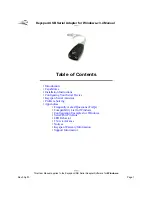
22.2.1 With Card and Socket Services
The enabler should NOT be used if any Card and Socket Services are present on the
system. If Card and Socket Services is installed, the enabler may interfere with its operation and
with the device(s) it controls. The client driver should be used to configure the MPAP-100 if
Card and Socket Services are installed.
22.2.2 Socket Numbers
The enabler requires the socket number to be specified on the command line. Some
vendors number their sockets beginning with 1 while other vendors number their sockets
beginning with 0. The enabler considers the first socket in the system to be socket 0.
22.2.3 Memory range exclusion
The enabler requires a region of high DOS memory. This region is 1000h bytes (4 KB)
long and by default begins at address D0000H (the address may be changed using the "W"
parameter). If a memory manager such as EMM386, QEMM, or 386Max is installed on the
system, this region of DOS memory must be excluded from the memory manager's control.
Consult the documentation provided with the memory manager software for instructions on how
to exclude this memory region.
Some systems use the high memory area for BIOS shadowing to improve overall system
performance. In order for the enabler to operate, BIOS shadowing must be disabled in the
address range specified for the configuration window. BIOS shadowing can usually be disabled
through the system's CMOS setup utility.
22.3 OS/2 Client Driver
22.3.1 Resources Not Available
It is the user's responsibility to ensure the I/O address and IRQ resources are available.
For OS/2 Warp users, the RMVIEW utility may be useful in finding resource conflicts. Type
"rmview /?" at an OS/2 command prompt for details. On OS/2 Warp 4.0, the Hardware
Manager object in the System Setup folder provides a graphical view of the same information.
22.3.2 Insufficient Number Of Command Line Arguments
The MPAP-100 command line must contain at least one command line argument for each
MPAP-100 to be installed.
22.3.3 Bad Parameters



































